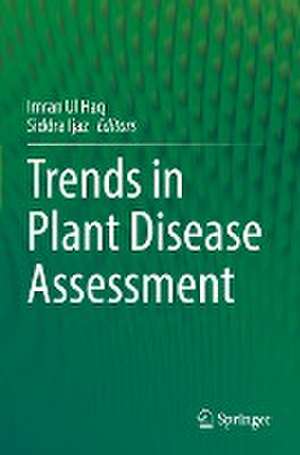Trends in Plant Disease Assessment
Editat de Imran Ul Haq, Siddra Ijazen Limba Engleză Paperback – 28 oct 2023
| Toate formatele și edițiile | Preț | Express |
|---|---|---|
| Paperback (1) | 1216.65 lei 6-8 săpt. | |
| Springer Nature Singapore – 28 oct 2023 | 1216.65 lei 6-8 săpt. | |
| Hardback (1) | 1222.80 lei 6-8 săpt. | |
| Springer Nature Singapore – 27 oct 2022 | 1222.80 lei 6-8 săpt. |
Preț: 1216.65 lei
Preț vechi: 1483.71 lei
-18% Nou
Puncte Express: 1825
Preț estimativ în valută:
232.80€ • 253.68$ • 196.17£
232.80€ • 253.68$ • 196.17£
Carte tipărită la comandă
Livrare economică 23 aprilie-07 mai
Preluare comenzi: 021 569.72.76
Specificații
ISBN-13: 9789811958984
ISBN-10: 981195898X
Pagini: 282
Ilustrații: IX, 282 p. 1 illus.
Dimensiuni: 155 x 235 mm
Greutate: 0.41 kg
Ediția:1st ed. 2022
Editura: Springer Nature Singapore
Colecția Springer
Locul publicării:Singapore, Singapore
ISBN-10: 981195898X
Pagini: 282
Ilustrații: IX, 282 p. 1 illus.
Dimensiuni: 155 x 235 mm
Greutate: 0.41 kg
Ediția:1st ed. 2022
Editura: Springer Nature Singapore
Colecția Springer
Locul publicării:Singapore, Singapore
Cuprins
1. Phytopathometry: A trans-disciplinary concept.- 2. Visual Estimation: a classical approach for plant disease estimation.- 3. Remote Sensing: A new tool for disease assessment in crops.- 4. Image analysis and processing approach: an automated plant disease recognition technology.- 5. Hyper-spectral imaging through Spatial and Spectral Sensors for Phytopathometry.- 6. Fluorescent imaging system-based plant phenotyping for disease recognition.- 7. Concept and Application of Infrared Thermography for Plant Disease Measurement.- 8. Application of Biosensors in Plant Disease Detection.- 9. Immunotechnology for Plant Disease Detection.- 10. Molecular Phytopathometry.- 11. Microarray technology for detection of plant diseases.- 12. Predictive Models for Plant Disease Assessment.- 13. Extension Plant Pathology.
Notă biografică
Dr. Imran Ul Haq, with a bright career in agriculture, plant pathology, and fungal molecular biology, had Post Doc from the University of California Davis, USA. He is currently serving as an Associate Professor in the Department of Plant Pathology, University of Agriculture Faisalabad, Pakistan. He has supervised more than 40 graduate students and established the Fungal Molecular Biology Laboratory Culture Collection (FMB-CC-UAF), an affiliated member of the World Federation for Culture. Collections (WFCC). He has published more than 50 research articles, 6 books, 4 laboratory manuals, and several book chapters. He has made colossal contributions to fungal taxonomy by reporting novel fungal pathogen species in plants. His research interests are fungal molecular taxonomy and nanotechnology integration with other control strategies for sustainable plant disease management.
Dr. Siddra Ijaz, with a vibrant career in agriculture and biotechnology, had a Post Doc from the Plant Reproductive Biology Laboratory, University of California Davis, USA. She is currently serving as an Associate Professor in the Center of Agricultural Biochemistry and Biotechnology (CABB), University of Agriculture, Faisalabad, Pakistan. She is also serving as Deputy Managing Editor of an international Impact factored Journal. She has supervised more than 50 M.Phil and Ph.D. students. She has published more than 50 research articles, 7 books, and several book chapters. Her research focus includes plant genome engineering using transgenic technologies, genome editing through CRISPR/Cas systems, nanobiotechnology, and exploration of genetic pathways in plant-fungus interactions.
Dr. Siddra Ijaz, with a vibrant career in agriculture and biotechnology, had a Post Doc from the Plant Reproductive Biology Laboratory, University of California Davis, USA. She is currently serving as an Associate Professor in the Center of Agricultural Biochemistry and Biotechnology (CABB), University of Agriculture, Faisalabad, Pakistan. She is also serving as Deputy Managing Editor of an international Impact factored Journal. She has supervised more than 50 M.Phil and Ph.D. students. She has published more than 50 research articles, 7 books, and several book chapters. Her research focus includes plant genome engineering using transgenic technologies, genome editing through CRISPR/Cas systems, nanobiotechnology, and exploration of genetic pathways in plant-fungus interactions.
Textul de pe ultima copertă
This edited book provides the readers with the concepts and in-depth knowledge of plant disease assessment and conventional and modern technologies that aid in precise and accurate phytomathometery. This book discusses the evolution of plant disease assessment procedures from the primary visual estimation-based assessment to modern approaches, their practical application for reliable disease quantification, yield loss estimation, and the efficacy of disease control strategies for sustainable crop protection. Significant information is provided on the major aspects of the topic, including remote sensing, imaging techniques, molecular phytopathometery, microarray, and immunotechnology. The book helps plant scientists, plant pathologists, practitioners, researchers, and students in disease quantification, developing predictive models for plant disease epidemics, assessing crop losses, and the magnitude of plant disease control methods.This book describes the classical plant disease assessment methods based on visual observations. It Provides information regarding the modern and emerging technologies in Phytopathometery, precision, and accuracy. This book also discusses the application of disease assessments in predictive models, disease warning systems, expert systems, and decision support systems in applied plant pathology
Caracteristici
Provides information regarding the modern and emerging technologies in Phytopathometery, precision, and accuracy Explores applied plant pathology via predictive models, disease warning systems, and decision support systems Describes the classical plant disease assessment methods based on visual observations
